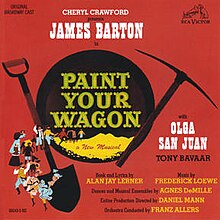
Frederick Loewe was an American composer. He collaborated with lyricist Alan Jay Lerner on a series of Broadway musicals, including Brigadoon, Paint Your Wagon, My Fair Lady, and Camelot, all of which were made into films, as well as the original film musical Gigi (1958), which was first transferred to the stage in 1973.

The Band Wagon is a 1953 American musical romantic comedy film directed by Vincente Minnelli, starring Fred Astaire and Cyd Charisse. It tells the story of an aging musical star who hopes a Broadway show will restart his career. However, the play's director wants to make it a pretentious retelling of the Faust legend and brings in a prima ballerina who clashes with the star. Along with Singin' in the Rain (1952), it is regarded as one of the finest Metro-Goldwyn-Mayer musicals, although it was a modest box-office success on first release.

Hello, Dolly! is a 1964 musical with lyrics and music by Jerry Herman and a book by Michael Stewart, based on Thornton Wilder's 1938 farce The Merchant of Yonkers, which Wilder revised and retitled The Matchmaker in 1954. The musical follows the story of Dolly Gallagher Levi, a strong-willed matchmaker, as she travels to Yonkers, New York, to find a match for the miserly "well-known unmarried half-a-millionaire" Horace Vandergelder.

Benjamin Augustus Vereen is an American actor, dancer and singer. Vereen gained prominence for his performances in the original Broadway productions of the musicals Jesus Christ Superstar, for which he received a Tony Award nomination, and Pippin, for which he won the 1973 Tony Award for Best Actor in a Musical.

Sweet Charity is a musical with music by Cy Coleman, lyrics by Dorothy Fields and book by Neil Simon. It was directed and choreographed for Broadway by Bob Fosse starring his wife and muse Gwen Verdon alongside John McMartin. It is based on the screenplay for the 1957 Italian film Nights of Cabiria. However, whereas Federico Fellini's black-and-white film concerns the romantic ups-and-downs of an ever-hopeful prostitute, in the musical the central character is a dancer-for-hire at a Times Square dance hall. The musical premiered on Broadway in 1966, where it was nominated for nine Tony Awards, winning the Tony Award for Best Choreography. The production also ran in the West End as well as having revivals and international productions.

Justin Guarini is an American singer, songwriter and actor who in 2002 was the runner-up on the first season of American Idol.
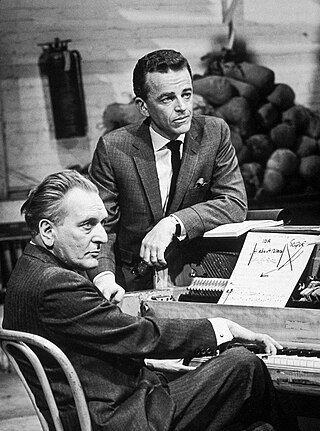
Lerner and Loewe refers to the partnership between lyricist and librettist Alan Jay Lerner and composer Frederick Loewe. Spanning three decades and nine musicals from 1942 to 1960 and again from 1970 to 1972, the pair are known for being behind the creation of critical on stage successes such as My Fair Lady, Brigadoon, and Camelot along with the musical film Gigi.
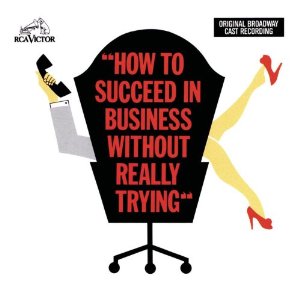
How to Succeed in Business Without Really Trying is a 1961 musical by Frank Loesser and book by Abe Burrows, Jack Weinstock, and Willie Gilbert, based on Shepherd Mead's 1952 book of the same name. The story concerns young, ambitious J. Pierrepont Finch, who, with the help of the book How to Succeed in Business Without Really Trying, rises from window washer to chairman of the board of the World Wide Wicket Company.

110 in the Shade is a musical with a book by N. Richard Nash, lyrics by Tom Jones, and music by Harvey Schmidt.

Gay Divorce is a musical with music and lyrics by Cole Porter and book by Dwight Taylor, adapted by Kenneth Webb and Samuel Hoffenstein. It was Fred Astaire's last Broadway show and featured the hit song "Night and Day" in which Astaire danced with co-star Claire Luce.

Sally Ann Howes was an English actress and singer. Her career on screen, stage and television spanned six decades. She is best known for the role of Truly Scrumptious in the 1968 musical film Chitty Chitty Bang Bang. In 1963, she was nominated for a Tony Award for Best Lead Actress in a Musical for her performance in Brigadoon.

Bloomer Girl is a 1944 Broadway musical with music by Harold Arlen, lyrics by E.Y. Harburg, and a book by Sig Herzig and Fred Saidy, based on an unpublished play by writer Daniel Lewis James and his wife Lilith. The plot concerns independent Evelina Applegate, a hoop skirt manufacturer's daughter who defies her father by rejecting hoopskirts and embracing comfortable bloomers advocated by her aunt "Dolly" Bloomer, who was inspired by the women's rights advocate Amelia Bloomer. The American Civil War is looming, and abolitionist Evelina refuses to marry suitor Jeff Calhoun until he frees his slave, Pompey.
Nola Fairbanks was an American actress. She was also the aunt of actor Matthew Modine.
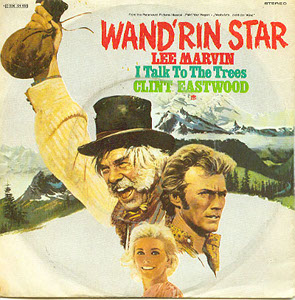
"Wand'rin' Star" is a song that was originally written by Alan J. Lerner (lyrics) and Frederick Loewe (music) for the stage musical Paint Your Wagon in 1951.
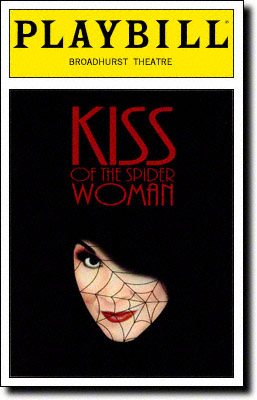
Kiss of the Spider Woman is a musical with music by John Kander, lyrics by Fred Ebb, and book by Terrence McNally. It is based on Manuel Puig's novel of the same name. Directed by Harold Prince, the musical had runs in Toronto (1992), the West End (1992-93) and Broadway (1993) and won the 1993 Tony Award for Best Musical, as well as acting awards for all three principals in the cast.
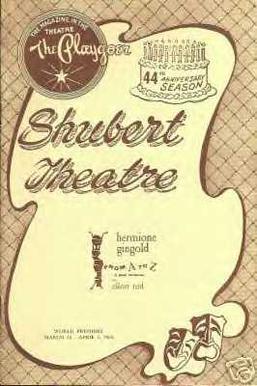
From A to Z is a musical revue with a book by Woody Allen, Herbert Farjeon, and Nina Warner Hook and songs by Jerry Herman, Fred Ebb, Mary Rodgers, Everett Sloane, Jay Thompson, Dickson Hughes, Jack Holmes, Paul Klein, Norman Martin, William Dyer, and Charles Zwar.
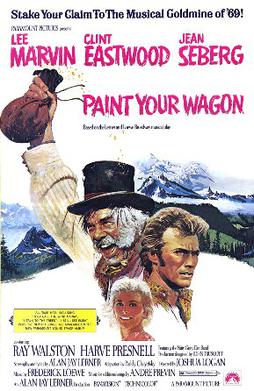
Paint Your Wagon is a 1969 American Western musical film starring Lee Marvin, Clint Eastwood, and Jean Seberg. The film was adapted by Paddy Chayefsky from the 1951 musical Paint Your Wagon by Lerner and Loewe. It is set in a mining camp in Gold Rush-era California. It was directed by Joshua Logan.

Between the Devil is a musical comedy with book and lyrics by Howard Dietz and music by Arthur Schwartz.
Ted Royal [Dewar] was an American orchestrator, conductor and composer for Broadway theatre. He was most active in the 1940s and 1950s, being associated with the very successful original productions of Lerner and Loewe's Brigadoon and Paint Your Wagon. Together with George Bassman he orchestrated Frank Loesser's Guys and Dolls. The dean of musical orchestrators, Robert Russell Bennett, remembered Royal as "one of Broadway's very special arrangers."

Fun Home is a musical theatre adaptation of Alison Bechdel's 2006 graphic memoir of the same name, with music by Jeanine Tesori, and book and lyrics by Lisa Kron. The story concerns Bechdel's discovery of her own lesbian sexuality, her relationship with her closeted gay father, and her attempts to unlock the mysteries surrounding his life. It is told in a series of non-linear vignettes connected by narration provided by the adult Alison character.
